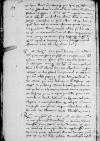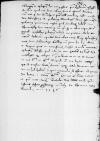In ⌊conventu Elbingensi novissime⌋ fuerat statutum, ut ⌊hic⌋ omnes ituri ad ⌊Regni comitia⌋ conveniremus, verum cum 1536-11-25⌊heri1536-11-25⌋ huc applicuissem, neminem dominorum praeter ⌊Gdanensium⌋ nuntios hic repperi parumque afuit, nisi me ⌊⌋ dominorum ⌊palatini Marienburgensis⌋, castellanorum  BCz, 244, p. 179 ⌊Elbingensis⌋ et ⌊Gdanensis⌋ hic occupassent, quin ⌊Luboviam⌋ rediissem. Sic omnia apud nos sine ordine fiunt et aguntur, decretum enim erat, quod hic de omnibus et quomodo nobis eundum esset, concludere debuissemus. Dominus ⌊palatinus Marienburgensis⌋ domi aeger mansit. ⌊Palatinus Pomeraniae⌋, nescio quid simultatis habens cum ⌊Thoronensibus⌋, ⌊huc⌋ venturus non est, sed in alia ripa fertur progredi. ⌊Castellanus Culmensis⌋ ubi sit, me praeterit. 1536-11-26⌊Hodie1536-11-26⌋ exiverunt habentes equites bene cultos XVIII nuntii ⌊Gdanensium⌋. 1536-11-27⌊Cras1536-11-27⌋ sum subsecuturus. Redditae mihi sunt hic ⌊⌋ ⌊Fabiani a Voyno⌋, quas in novissimis ⌊⌋ se cuidam mercatori Gdanensi dedisse. Quid actum sit cum citatione, ex litteris ⌊eius⌋ intelliget. Quod reliquum est, prudentiae ea in re et amori in me Dominationis Vestrae Reverendissimae commendo etc. Ex ⌊Lipsia⌋ accepi, quae de ⌊Erasmo Rote(rodamo)⌋ feruntur, iisque addidi. Novarum rerum hic nihil habetur. Si quid inter eundum se offeret, non patiar diu latere Dominationem Vestram Reverendissimam. Cui me et omnes meos ut patri meo carissimo commendo. Dominus Deus eandem quam diutissime sospitet prosperetque in omnibus.
BCz, 244, p. 179 ⌊Elbingensis⌋ et ⌊Gdanensis⌋ hic occupassent, quin ⌊Luboviam⌋ rediissem. Sic omnia apud nos sine ordine fiunt et aguntur, decretum enim erat, quod hic de omnibus et quomodo nobis eundum esset, concludere debuissemus. Dominus ⌊palatinus Marienburgensis⌋ domi aeger mansit. ⌊Palatinus Pomeraniae⌋, nescio quid simultatis habens cum ⌊Thoronensibus⌋, ⌊huc⌋ venturus non est, sed in alia ripa fertur progredi. ⌊Castellanus Culmensis⌋ ubi sit, me praeterit. 1536-11-26⌊Hodie1536-11-26⌋ exiverunt habentes equites bene cultos XVIII nuntii ⌊Gdanensium⌋. 1536-11-27⌊Cras1536-11-27⌋ sum subsecuturus. Redditae mihi sunt hic ⌊⌋ ⌊Fabiani a Voyno⌋, quas in novissimis ⌊⌋ se cuidam mercatori Gdanensi dedisse. Quid actum sit cum citatione, ex litteris ⌊eius⌋ intelliget. Quod reliquum est, prudentiae ea in re et amori in me Dominationis Vestrae Reverendissimae commendo etc. Ex ⌊Lipsia⌋ accepi, quae de ⌊Erasmo Rote(rodamo)⌋ feruntur, iisque addidi. Novarum rerum hic nihil habetur. Si quid inter eundum se offeret, non patiar diu latere Dominationem Vestram Reverendissimam. Cui me et omnes meos ut patri meo carissimo commendo. Dominus Deus eandem quam diutissime sospitet prosperetque in omnibus.
 BCz, 244, p. 179
BCz, 244, p. 179 
